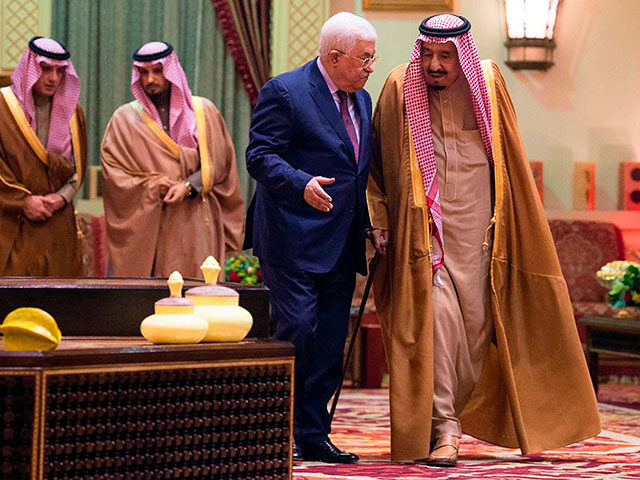The government of Saudi Arabia will reportedly end an eight-year embargo on funding the Palestinian Authority (PA) with millions of dollars in relief money for the “humanitarian situation in the Gaza Strip and surrounding areas.”
The Saudi Foreign Ministry did not specify exactly how much it would send to its “brothers in Palestine,” but a senior PA official told the New York Times (NYT) on Friday it would be at least $60 million, broken up into six payments. The first payment is expected by the PA within a matter of days.
Four other Palestinian officials and four anonymous diplomats confirmed this account, vaguely indicating the Saudi payments would add up to “tens of millions of dollars.”
Senior PA presidential adviser Mahmoud al-Habbash told the Times of Israel (TOI) that the Saudis pledged financial support to President Mahmoud Abbas when he paid a visit to Saudi Arabia in August.
The PA rules the West Bank, not Gaza, which is largely under the control of the savage Hamas terrorist organization. The Saudis presumably found it both politically impossible and deeply unwise to give their millions to Hamas, which has a long history of stealing humanitarian aid money and supplies to fuel its terror machine.
The PA might be the lesser of two evils in Palestinian government, but not by much. The PA has a well-earned reputation for corruption and inefficiency. It has alienated the Israeli government by supporting terrorism and alienated militant Palestinians by not supporting terrorism enough. Hamas violently expelled the PA from Gaza in 2006 and many observers are skeptical the PA could ever regain enough influence to administer Gaza effectively after the Israelis conclude their operation against Hamas.
“I think the current authority, in its present form and with the men leading it, is unable to even set foot in the Gaza Strip, let alone handle the major tasks required at this time,” influential Palestinian politician Nasser al-Qudwa said last November.
Nasser al-Qudwa is a potential future PA president who happens to be the nephew of Yasser Arafat, so his dour assessment of the PA’s status in the wake of the October 7 atrocity was noteworthy. He has since worked with former Israeli Prime Minister Ehud Olmert on a proposal for Palestinian statehood, but one of the perennial problems with such proposals is that the Palestinians have so much trouble mustering a respectable, effective, and peaceable government.
Saudi Arabia abruptly halted about $20 million per month in funding for the PA in 2016. The payments were cut off fully six months before the Saudis said anything about the matter in public.
PA representatives claimed they could not get the Saudis to explain why they halted the funding. At first they floated theories about a cash crunch at the Saudi Foreign Ministry prompting across-the-board cuts in foreign aid, but as the funding freeze dragged on, it became clear the Kingdom had serious problems with the leadership of Mahmoud Abbas.
Abbas has been the president of the PA since 2005, when he won a four-year term that is about to enter its 20th year. The PA does not hold elections anymore, in part because they know Hamas would probably win if they did.
Some more money flowed to the PA over the next few years, but the Saudis froze all assistance to the Palestinian Authority in 2021.
In September 2023, former Secretary of State Mike Pompeo said the Saudis still hoped to normalize relations with Israel and they came to see Abbas as an obstacle to that goal. Pompeo said the Saudis were also disgusted with the “rampant corruption” of the PA and would begin “attaching conditions” to future financial assistance.
Crown Prince Mohammed bin Salman (MBS), the de facto chief executive of Saudi Arabia, laid out some of those conditions to Abbas, including demands for the PA to reduce violence in the West Bank and rein in terrorism. MBS reportedly told Abbas that he was planning to normalize diplomatic relations with Israel and Abbas needed to get with the program if he wanted those Saudi millions to keep flowing into his coffers.
Hamas attacked Israel about two months later, throwing peace and security plans into disarray.
Analysts told the NYT on Monday that the Saudis are turning the money spigot back on because they fear the PA could “implode,” creating a power vacuum that could quickly be filled by something much worse. MBS appears committed to his plan of offering normalization with Israel as part of some grand deal that would include Palestinian statehood.
“For Saudi Arabia, a two-state solution is essential. They’re not saying the Palestinian Authority is a great institution, but they are saying it must not collapse in order to preserve the possibility of establishing a Palestinian state,” said Arab Gulf States Institute senior resident scholar Hussein Ibish.
Prince Faisal bin Farhan, the Saudi foreign minister, said as much during his visit to the U.N. General Assembly last week.
“Implementing the two-state solution is the best solution to break the cycle of conflict and suffering and enforce a new reality in which the entire region, including Israel, enjoys security and coexistence,” said Faisal.

COMMENTS
Please let us know if you're having issues with commenting.